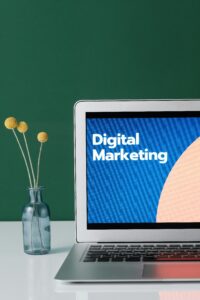Digital Marketing – A Complete Guide
Digital Marketing is the promotion of products, services, or brands using digital channels such as websites, social media, search engines, email, and mobile apps.
It allows businesses to reach their target audience anytime, anywhere in the online space.
Compared to traditional marketing, digital marketing is cost-effective, measurable, and more interactive.
 Why Digital Marketing is Important
Why Digital Marketing is Important
The internet has over 5 billion active users worldwide.
Customers now search online before buying anything.
Digital marketing gives small businesses the chance to compete with larger companies.
Offers measurable results with analytics tools.
Increases brand awareness quickly.
 Key Components of Digital Marketing
Key Components of Digital Marketing
1. Search Engine Optimization (SEO)
Optimizing your website so it ranks higher in Google search results.
Includes keyword research, on-page SEO, off-page SEO, and technical SEO.
Example: A bakery ranking at the top when someone searches “best cake shop near me”.
2. Content Marketing
Creating valuable and relevant content to attract and engage your audience.
Can be blogs, videos, infographics, podcasts, or eBooks.
Builds trust and establishes you as an expert in your field.
3. Social Media Marketing (SMM)
Using platforms like Facebook, Instagram, LinkedIn, and Twitter to connect with customers.
Helps in brand building and driving traffic to your website.
Paid ads can target specific age groups, locations, and interests.
4. Email Marketing
Sending personalized messages directly to a customer’s inbox.
Used for product updates, promotions, or newsletters.
One of the highest ROI marketing methods.
5. Pay-Per-Click (PPC) Advertising
Running ads on platforms like Google Ads or Facebook Ads.
You pay only when someone clicks on your ad.
Great for driving immediate traffic.
6. Affiliate Marketing
Promoting other people’s products and earning a commission on sales.
Example: A blogger recommending a product through a special link.
7. Influencer Marketing
Partnering with popular online personalities to promote your product.
Works best when influencers have a loyal and active audience.
8. Mobile Marketing
Reaching customers through SMS, mobile apps, and push notifications.
Important because most people use smartphones daily.
 Benefits of Digital Marketing
Benefits of Digital Marketing
Global Reach – Reach customers worldwide without a physical store.
Low Cost – Cheaper than TV, radio, or print advertising.
Precise Targeting – Reach people who are most likely to buy.
Measurable Results – Track every click, impression, and sale.
Faster Conversions – Shortens the buying process.
24/7 Marketing – Your business is online all the time.
 Steps to Start Digital Marketing
Steps to Start Digital Marketing
Define your goals (sales, leads, brand awareness).
Identify your target audience.
Build a professional website.
Optimize your site for SEO.
Start content creation (blogs, videos, social posts).
Choose the right social media platforms.
Run paid ad campaigns if budget allows.
Track performance with analytics tools.
Keep testing and improving strategies.
 Latest Trends in Digital Marketing (2025)
Latest Trends in Digital Marketing (2025)
AI-Powered Marketing – Personalized recommendations, chatbots, and predictive analysis.
Voice Search Optimization – Optimizing for Alexa, Siri, and Google Assistant queries.
Short-Form Video Content – Reels, TikTok videos, and YouTube Shorts.
Interactive Content – Quizzes, polls, and live streams.
Sustainability Marketing – Promoting eco-friendly initiatives.
 Common Mistakes to Avoid
Common Mistakes to Avoid
Ignoring mobile optimization.
Posting without a content strategy.
Not tracking analytics.
Trying to be active on every platform instead of focusing on the best ones.
Over-promoting instead of providing value.
 Conclusion
Conclusion
Digital marketing is not a one-time activity but a continuous process.
Businesses that adapt to changing trends and focus on customer value succeed faster.
Whether you are a startup, small business, or large enterprise, digital marketing is your key to growth in today’s world.
